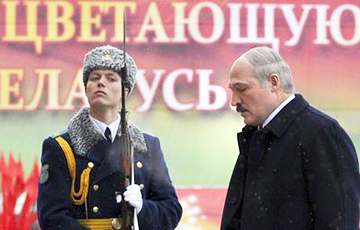Lukashenka Has No Trust in His "Vertical"
61- 3.01.2017, 9:09
- 35,347

Structural crisis is getting worse in Belarus.
Strategy analytical centre and Mises Research Centre summed up 2016 year.
Results are disappointing.
2016 year was the year of prolonged recession, accumulation of structural imbalances, aggravation of system contradictions, erosion of basic legal and economic institutions.
The Belarusian model of a centrally planned economy, authoritarian rule and domination of public ownership follows the same theoretical and practical errors that led the Soviet Union to a deep crisis, ej.by writes.
Instead of creation of a highly-efficient freedom of production, trade, competition and technologies the authorities have made a bet on a militarized, power management techniques.
Year 2016 was the year of growth of bureaucratic and regulatory burden on the economy. The lion's share of government's activity was not focused on neutralization of economic problems, social risks and search of new sources of the economic growth. State administration bodies worked not on country's recovery from the recession and creation of institutions for rapid and long-term economic growth, but on bureaucratic tasks and status monetization of certain entities within the system of decision-making, management of state assets, allocation of budgetary resources. Instead of liberalization of private initiative, entrepreneurship, authorities used the tactics of "prohibition and fines".
2016 year became the year of deterioration in the quality of public administration. The country's leadership failed to create a professional team of opinion allies, which could run as a well-oiled machine to overcome crisis in the economy. It did not show a political demand for a nationwide organization, consolidated elite dialogue.
Nomenclature monologue mode proved ineffective. Political and ideological dogma, inertia of defective institutions, no access to employment system to clear it from unprofessional, incompetent staff that generates costs only did not let adequate, meaningful and quality solutions to bring the country out of its deep crisis.
2016 year became the year of accelerated erosion of the private property institution. The principle of limited liability through extensive application of subsidiary liability principle suffers crisis in Belarus. Principle of presumption of innocence is constantly violated, as well as "you should observe the non-retroactivity of law". Ruinous fines, criminalization of economic legislation, confiscation of property, withdrawal of money from bank accounts without a court decision, high costs of debt collection from state-owned organizations, imposition of bureaucratic point of view on the reasonableness of prices and costs, forced commodity assortment-authorities did not stop to nightmarize business but started to use more sophisticated techniques and tools.
2016 year became the year of debt accumulation, illiquid assets, troubled assets and "frozen" capital in the banking and real sectors of the economy, as well as in the public administration sector. The government continued to build public debt pyramid, including currency one worsening the risk of the country being trapped in a long-term stagnation.
2016 year became a year lost for the diversification of exports and sources of funding. Amid the negative impact of the Eurasian Economic Union (EEU) the Belarusian economy became more dependent on the Russian market. Due to impairments of private ownership and unacceptable conditions for foreign direct investors the implementation of investment projects of Belarus experience a real investment famine.
2016 year became the year of anti-social policy. The authorities failed to equally share burden of crisis between institutions. The poverty level has increased. The situation on the labour market is getting worse. Ineffective fight against so-called parasites has led to social tension. Instead of a full-fledged pension reform the retirement age has been increased and the formula for calculation of pensions has been amended that will inevitably lead to a reduction in pension payments. Tariff policy of public infrastructure monopolies has sharply increased expenditures on housing and communal services. Oligopolistic practices in the market of medicines, medical and educational services increased expenditures of households on their purchase.
2016 year became the year of erosion of trust. Lukashenka does not trust his vertical that increases costs of control and power structures. The Council of Ministers and the National Bank do not work together which reduces the quality of public administration. Local authorities do not trust common to the whole republic. The authorities do not trust business. Have Business does not trust in the authorities, which leads to higher prices, devaluation and inflationary expectations.
One-side dialogue only exacerbates the crisis of confidence. An acute shortage of a culture of dialogue, respect for views of the minority, solidarity and partnership exacerbate structural, system crisis.









